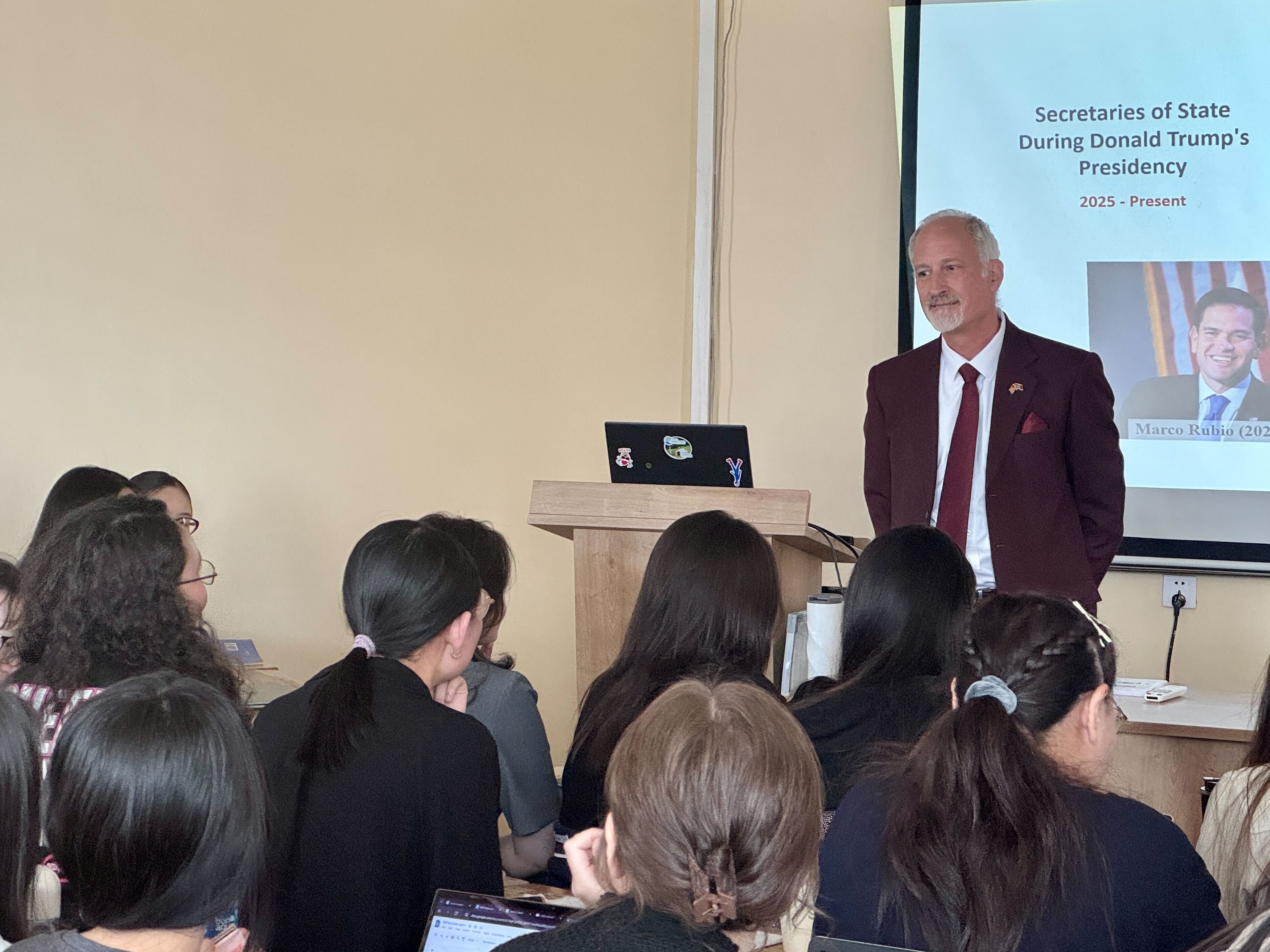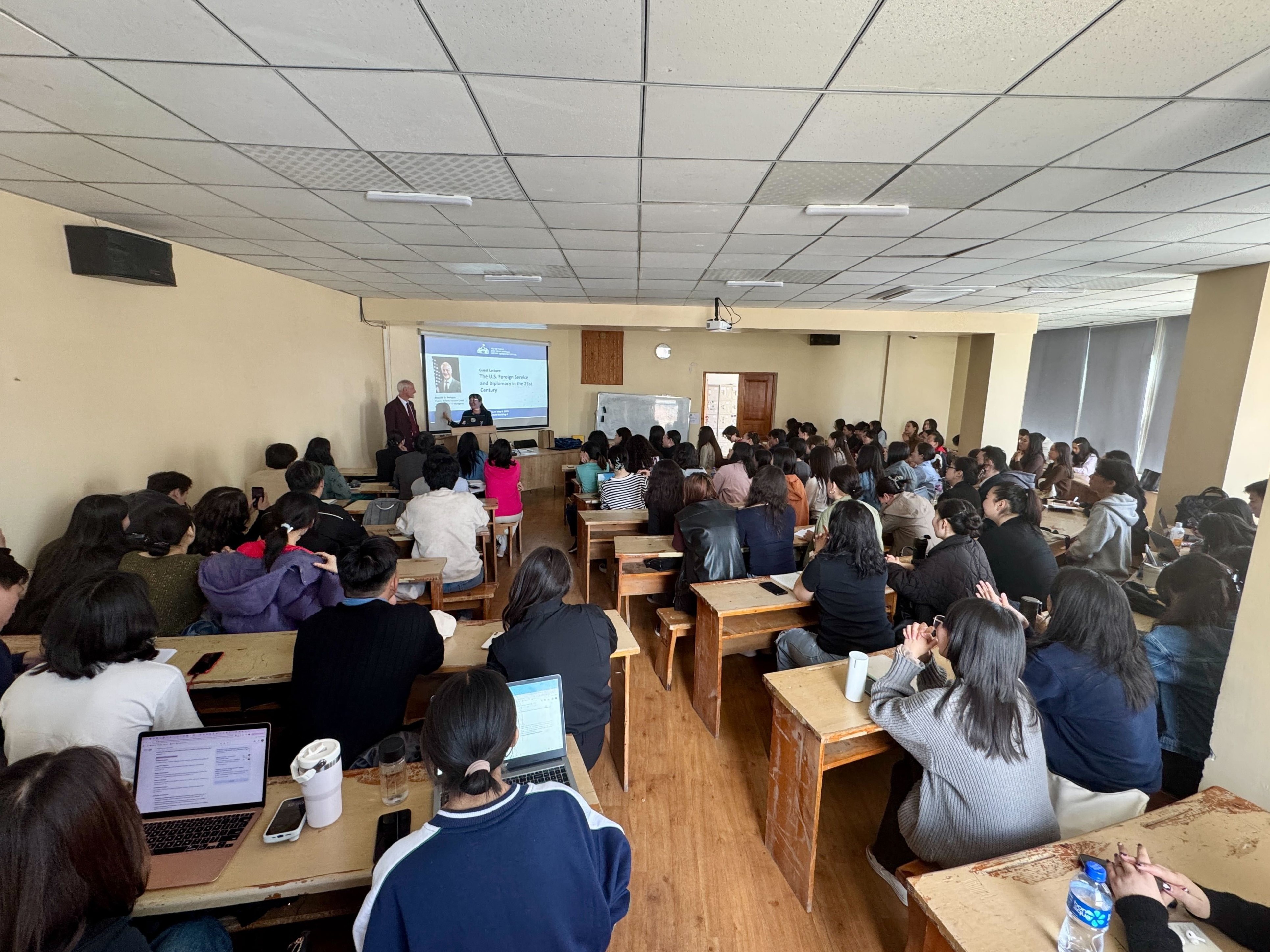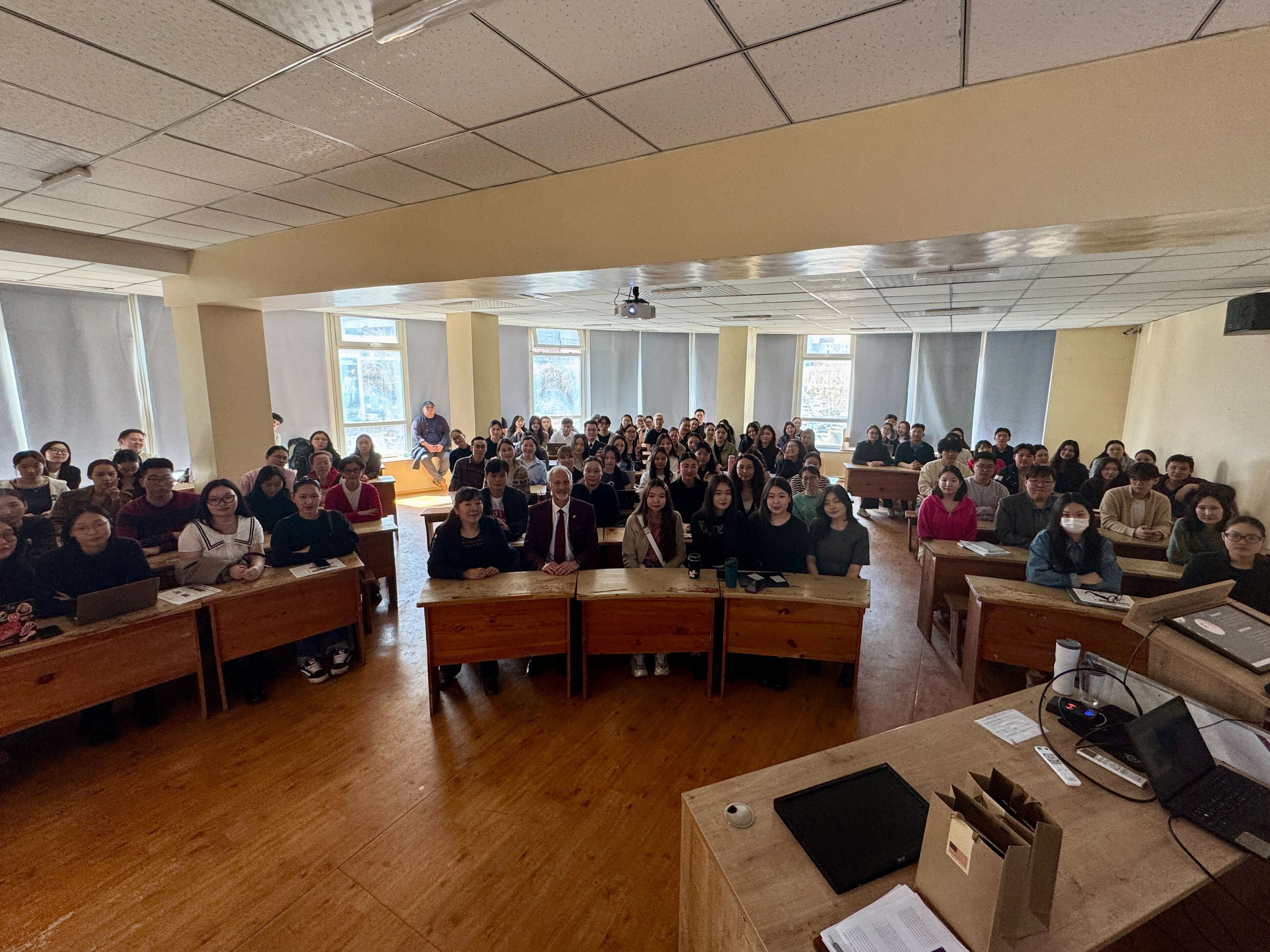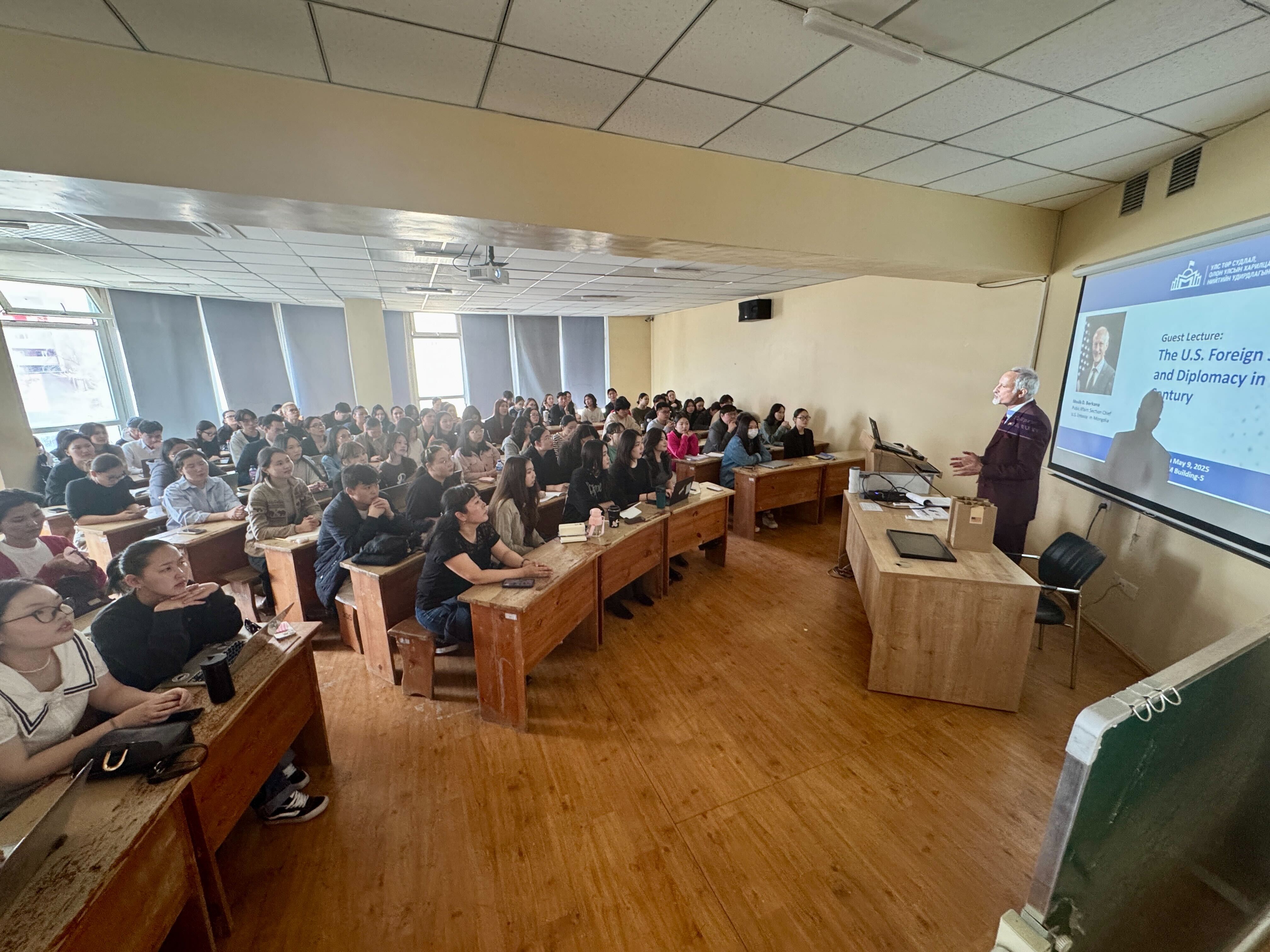- “ОЛОН УЛСЫН ХАРИЛЦАА” СЭТГҮҮЛД ӨГҮҮЛЛЭЭ ИРҮҮЛЭХИЙГ УРЬЖ БАЙНА
- МУИС-ийн Улс төр судлал, олон улсын харилцаа, нийтийн удирдлагын сургууль ХБНГУ-ын Фридрих Эбертийн сангийн Монгол дахь суурин төлөөлөгчийн газар хамтран ажиллана
- Монгол-Японы Их сургууль хоорондын хамтын ажиллагаа бүс, орон нутгийн хүрээнд өргөжиж байна
- Монгол Улсын Их Хурлын гишүүн, Засгийн газрын гишүүн, Гадаад харилцааны сайд Батмөнхийн Батцэцэгт
- “Төрийн үйлчилгээний процессын дахин инженерчлэл” зэргийн бус сургалтын гэрчилгээ гардууллаа
- ЕРӨНХИЙЛӨГЧИЙН ИТАЛИ БОЛОН ГЭГЭЭН ШИРЭЭТ УЛСАД ХИЙСЭН АЙЛЧЛАЛЫН БҮРЭЛДЭХҮҮНД ОУХТ-ИЙН БАГШ НАР БАГТАВ
- “Улс төрийн мэдээлэл харилцааны онол, судалгааны арга зүй”, “Улс төрийн мониторинг, мэдээлэл боловсруулах арга зүй” хичээлүүдэд зочин багшийн хичээл орлоо
- “Хүний нөөцийн менежментийн улсын XIV олимпиад”-д МУИС-ийн УТСОУХНУС-ийн баг хамт олон амжилттай оролцлоо
- УТСОУХНУС-ийн Оюутны зөвлөлөөс зохион байгуулсан Эрдэм шинжилгээний хурал амжилттай болж өнгөрлөө
- Нийтийн удирдлагын тэнхимийн бакалаврын түвшний оюутнуудын эрдэм шинжилгээний хурал боллоо
- ЗХААБССХ болон УТСОУХНУС хамтын ажиллагааны санамж бичигт гарын үсэг зурлаа
- МУИС-УТСОУХНУС-ийн Нийтийн удирдлагын тэнхимийн ахисан түвшний эрдэм шинжилгээний хурал амжилттай болж өндөрлөлөө
- УТСОУХНУС-ийн ОУХ-ны хөтөлбөрийн Ахисан түвшний магистрант, докторантуудын намрын улирлын эрдэм шинжилгээний хурал амжилттай зохион байгуулагдлаа
- УТСОУХНУС-ийн ОУХарилцааны хөтөлбөрийн бакалаврын түвшний эрдэм шинжилгээний хурал амжилттай зохион байгуулагдлаа
- International relations program graduates donated professional textbooks
- Хамтын ажиллагааны санамж бичигт гарын үсэг зурлаа
- 2025-2026 оны ээлжит МУИС-УТСОУХНУС Оюутны Зөвлөлийн зохион байгуулсан
- “ПОЛИТОЛОГИ” ЭРДЭМ ШИНЖИЛГЭЭНИЙ СЭТГҮҮЛИЙН 24 ДЭХ ДУГААРТ ӨГҮҮЛЭЛ АВЧ ЭХЭЛЛЭЭ
- УЛС ТӨР, ОЛОН УЛСЫН ХАРИЛЦАА, НИЙТИЙН УДИРДЛАГЫН СУРГУУЛЬД “СУДАЛГААНЫ ИХ СЕМИНАР” БОЛЛОО
- “Төрийн үйлчилгээний процессын дахин инженерчлэл” зэргийн бус сургалтын хөтөлбөрийн нээлт боллоо
- Судалгааны их семинар амжилттай зохион байгуулагдлаа
- УТСОУХНУС Японы Нийгата мужийн их сургуулийн хамтарсан хөтөлбөрийн талаар ярилцав
- Судалгааны их семинар болно.
- Public Administration Week 2025 Concludes at NUM with Meaningful Dialogue, Research, and Recognition
- ТАЛАРХАЛ
- “Best Paper Awards” was successfully held.
- “Төрийн бодлого” номын нээлт
- NUM Leadership XIV International Conference Explores “Public Administration of the Future”
- “МУИС – МАНЛАЙЛАЛ – ШИЛЖИЛТИЙН ҮЕИЙН ЧАДАВХЫН ХӨГЖИЛ”, ОЛОН УЛСЫН ЭРДЭМ ШИНЖИЛГЭЭНИЙ ЦУВРАЛ XIV ХУРЛЫН ХҮНДЭТ ЗОЧДЫГ ХҮЛЭЭН АВЧ УУЛЗЛАА.
- UB Impulse XXIV Explores “Resource Rivalries: The Politics of Critical Minerals”
- ХБНГУ-ын Шпайерын Төрийн Удирдлагын Их Сургуулийн Ректор Проф. Др. Холгер Мюленкамп МУИС-н оюутнуудад лекц уншлаа.
- “Нийтийн удирдлагын долоо хоног” эхэллээ
- Celebrating the International Day of Peace: Insights from Nick Millward and Oyunsuren Damdinsuren
- МУИС-ийн УТСОУХНУС-ийн захирал С. Мөнхбатыг Монгол Улсын Төрийн албаны зөвлөл хүлээн авч уулзлаа
- Нийтийн удирдлагын тэнхимийн зочин профессор Др. Жон Даффигийн нэрэмжит "Best paper awards"-д оролцохыг урьж байна
- SPSIRPA and ERINA-UNP joint international conference “Regional Economies in a Shifting World Order: Northeast Asia Amid Global Uncertainty”
- Нийт төгсөгчдөдөө баярын мэнд хүргэе
- SPSIRPA OSCARS 2025 БОГИНО ХЭМЖЭЭНИЙ КИНО НААДАМ амжилттай болж өндөрлөлөө
- МУИС-ийн УТСОУХНУС болон БНХАУ-ын Жилиний Их Сургуулийн хамтын ажиллагааны уулзалт
- “How different cultures have resolved conflicts before the Geneva Conventions” (A Guest Lecture by Dr. Samuel White)
- Хамтын бүтээл хэвлэгдэн гарлаа
- АВСТРАЛИ УЛСААС МОНГОЛ УЛСАД СУУГАА ЭСЯ-Д ЗОЧИЛСОН НЬ
- УТСОУХНУС-ийн оюутны эрдэм шинжилгээний хурал боллоо
- МУИС-ийн Улс төр судлал, олон улсын харилцаа, нийтийн удирдлагын сургууль БНСУ-ын Чоннам их сургуультай хамтын ажиллагаа байгуулахаар тохирлоо
- THE U.S. FOREIGN SERVICE AND DIPLOMACY IN THE 21ST CENTURY (A Guest Lecture by Mr. Moulik D. Berkana)
- SPSIRPA FORUM 2025 олон улсын эрдэм шинжилгээний хурал боллоо
- МУИС-ИЙН УЛС ТӨР СУДЛАЛ, ОЛОН УЛСЫН ХАРИЛЦАА, НИЙТИЙН УДИРДЛАГЫН СУРГУУЛЬ БНСУ-ЫН СҮНГШИЛ ИХ СУРГУУЛИЙН НИЙГМИЙН УХААНЫ СУРГУУЛЬТАЙ ХАМТЫН АЖИЛЛАГААНЫ САНАМЖ БИЧИГ БАЙГУУЛЛАА
- УТСОУХНУС-ийн Улс төр судлалын тэнхимийн ахисан түвшний оюутнуудын эрдэм шинжилгээний хурал боллоо
- 2025 оны SPSIRPA форумд дэлхий дахины геополитикийн өөрчлөлтийн талаар хэлэлцэнэ
- Дипломат албаны музейд зочилсон сэтгэгдэл
THE U.S. FOREIGN SERVICE AND DIPLOMACY IN THE 21ST CENTURY (A Guest Lecture by Mr. Moulik D. Berkana)
By Nasanjargal Bishkhuu
On May 9, 2025, Ms. Oyunsuren Damdinsuren’s Diplomatic and Consular Relations course welcomed Mr. Moulik D. Berkana, Chief of the Public Affairs Section at the U.S. Embassy in Mongolia, for a distinguished guest lecture. With extensive experience in public diplomacy, Mr.Berkana offered students a comprehensive overview of U.S. foreign service and diplomacy in the 21st century.
Opening his lecture with a relatable statement, Mr. Berkana remarked, "You don’t need to like all things about America, but you might appreciate aspects like its movies and music. My job is to help you like America more." This approach set the tone for an engaging discussion on the nuances of public diplomacy.
During the session, Mr. Berkana provided an insightful overview of U.S. foreign policy shifts from the 1990s to the present, emphasizing key changes under each administration:
Bill Clinton set the stage for the U.S. to embrace a more interconnected global economy. Through initiatives like the North American Free Trade Agreement (NAFTA) and supporting China's entry into the World Trade Organization (WTO), Clinton promoted globalization and free trade. His approach was grounded in the belief that economic integration could foster peace and prosperity, helping the U.S. solidify its leadership in the global economy.
In contrast, George W. Bush took office during a time of shifting international power balances, especially after the events of September 11, 2001. While continuing to prioritize economic relations, Bush's foreign policy was defined by his effort to strengthen ties with Russia and China, navigating the complex landscape of international relations while focusing on combating terrorism. His administration marked a shift toward a more reactive and security-focused approach to foreign policy.
Barack Obama ushered in a new era of diplomacy, emphasizing a shift from military interventions to a more multilateral and strategic approach. The “Pivot to Asia” strategy was central, aiming to strengthen U.S. presence and partnerships in the Asia-Pacific region. Obama’s use of “smart power” diplomacy, combining military strength, diplomacy, and development, as well as expanding digital diplomacy efforts, aimed to create stronger international partnerships, especially in light of rising powers like China. His policies sought to restore multilateral engagement that the U.S. had lost during Bush's tenure.
John Kerry, as Secretary of State under Obama, continued this focus on multilateral diplomacy, achieving significant international agreements such as the Paris Climate Agreement and the Iran Nuclear Deal. Kerry's approach underscored the importance of cooperation with global allies to address challenges like climate change and nuclear proliferation, positioning diplomacy as central to U.S. foreign policy.
However, Donald Trump represented a sharp departure from the previous administrations. Embracing the "America First" strategy, he pulled the U.S. out of both the Paris Climate Agreement and the Iran Nuclear Deal, signaling a move toward unilateralism and a more transactional approach to international relations. Trump’s foreign policy was marked by skepticism of multilateral institutions and agreements, focusing instead on prioritizing U.S. interests above all else.
Together, these presidencies illustrate the shifting balance between global engagement and national interest, from Clinton's embrace of globalization, through Obama’s multilateralism, to Trump’s focus on unilateral action. The U.S. foreign policy journey from 1992 to 2020 encapsulates the evolving global order and America's changing role within it.
Mr. Berkana's lecture provided students with a nuanced understanding of the complexities and dynamics of modern diplomacy, emphasizing the importance of adaptability.
Following the lecture, Saruul Khishigsuren, Exchange Outreach Coordinator, Public Affairs Section, U.S. Embassy, introduced various study and exchange opportunities in the United States, funded by the U.S. Department of State, such as Global UGRAD, which offers a full scholarship for university students to study one semester in the U.S.



